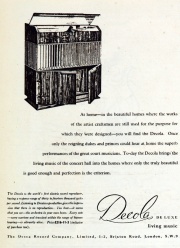Decca Record Co






of Brixton Road, London and New Malden, Surrey.
1929 Public issue of shares in the Decca Record Company which would bring together the manufacture of gramophones with the making of records in one company[1] by acquiring the Decca Gramophone Co and merging it with the record making facility at New Malden that the promoters already owned. Edward Roberts Lewis was the motivating force behind this bid[2].
1931 Agreement with Polyphon gave Decca exclusive British licence to records on this label[3].
1932 Capital reconstruction.
1932 Acquired Warner-Brunswick Ltd, giving the rights to Panachord, Panatrope and Brunswick labels[4].
1933 Failed to raise extra funds through issue of debentures.
Mid-1930s Decca and EMI were the only British survivors of the slump in demand for recordings[5].
1934 Decca Records Inc. founded in USA[6].
1935 Further fund raising.
1937 Acquired the record business of Crystalate Gramophone Record Manufacturing Co Ltd[7].
Harvey Schwartz of Brunswick was responsible for revolutionary ideas in radar[8].
1939 Second financial reconstruction of the business.
1940 Paid first dividend[9].
WWII Manufactured parts for the De Havilland Mosquito [10]. Decca Navigator guided the invasion fleets on D-Day[11].
1944 The business carried on by Decca Radio and Television Ltd was absorbed by Decca Record Co; the radio section was carrying on work of national importance[12].
1945 New subsidiary Decca Navigator Co was being set up.
1947 Set up London Gramophone Co as subsidiary to handle export of radio equipment to the USA.
1950 Introduction of micro-groove long playing record in US and Canadian markets[13].
1953 Manufacturer of TV sets [14]. Name of London Gramophone Co changed to London Records Incorporated. Considerable expansion of the research laboratories. Number of staff employed by the company was about 3000. Edward Roberts Lewis had become managing director[15].
1954 Purchased Reid and Sigrist of Leicester, makers of gyros and other aircraft instruments[16].
1956 Gained UK rights to publish records of the RCA label[17].
1958 E. R. Lewis was chairman[18].
1959 Agreement with US manufacturers of the choice of stereo system to be used in records; Reid and Sigrist had developed a stereo pickup[19].
1961 Manufacturers and distributors of records, record-reproducers, radio and television. Gramophone records include "Decca", "Brunswick" "London" "RCA" "Warner" "Felsted" "Beltona" "Telefunken" "Darium" and "Vocalion"
1962 Name of the group was changed to Decca Ltd, a holding company with 3 subsidiaries[20]:
1980 Sold its recording and music publishing business to Polygram, for an amount depending on future sales plus a lump sum for the assets of Decca Record Co[21].
1980 Racal won the battle with GEC to acquire the Decca company[22] forming Racal-Decca
See Also
Sources of Information
- ↑ The Times, 18 February 1929
- ↑ The Times, 19 January 1980
- ↑ The Times, 12 October 1932
- ↑ The Times, 12 October 1932
- ↑ The Times, 19 January 1980
- ↑ The Times, 16 March 1935
- ↑ The Times, 2 March 1937
- ↑ The Times, 19 January 1980
- ↑ The Times, 22 March 1951
- ↑ Mosquito by C. Martin Sharp and Michael J. F. Bowyer. Published by Crecy Books in 1995. ISBN 0-947554-41-6
- ↑ The Times, 29 August 1945
- ↑ The Times,3 October 1944
- ↑ The Times, 8 March 1950
- ↑ Choosing your Television Set
- ↑ The Times, 24 March 1953
- ↑ The Times, 9 February 1955
- ↑ The Times, 3 April 1957
- ↑ The Times, 11 March 1958
- ↑ The Times, 27 February 1959
- ↑ The Times, 21 November 1962
- ↑ The Times, 19 January 1980
- ↑ The Times, 15 February 1980

